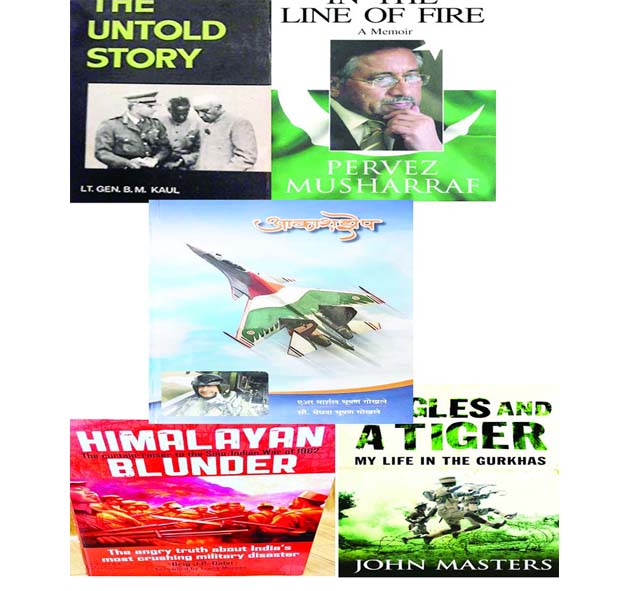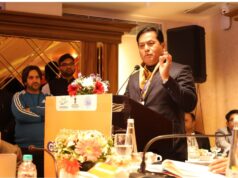Wielding the Pen Deftly as a Gun

By Colonel Satish Singh Lalotra
‘Writing to me is simply thinking through my fingers’—Issac Asimov.
Writing has suddenly become fashionable. Young people in their teens or even in their 20s have come up with marvellous collection of books in an age dominated by a digitized world having cogs like WhatsApp, twitter, Instagram ruling the hearts and minds of the people regardless of their country’s affiliations.
At the click of the mouse a whole literary world unwarps in front of you. So why write? All this is happening in an age where the number of actual readers is on the rapid decline. How different it was all about 45 years back when I had finished school and was dreaming of becoming something in life, with writer too on my radar of thinking. There was nothing fashionable about becoming a writer then, you were just a by-line (not even a face) and if you failed you might well have ended up as a nonentity. A writer is a specialist at using words. To quote the above mentioned statement at the beginning of this article by the famous American writer cum professor of repute-“Writing to me is simply thinking through my fingers’ unquote.
That brings me to the actual topic of my write up-‘Wielding the pen deftly as a gun’ with special reference to service officers. Think of all the great or successful writers who were once in uniform. HE .Btaes served in the RAF during the 2WW and wrote several fine novels based on his experience -‘Fair stood the wind for France’ The purple plain,The Jacaranda tree etc. John Masters served in the Indian army and wrote on top to become a specialist in churning out bestsellers including a” memoir of his army life”, “Bugles and a tiger” etc. TE Lawrence who fought with the Arabs in their revolt against the Turks during the 2WW gave the literary world a masterpiece in the form of ‘The seven pillars of wisdom’. To top it all Sir Winston Churchill war time PM of England once as a young captain stationed at Bangalore in India went on to become a great writer and ended his days writing a 6-volume history of 2WW and a 4 volume history of English speaking people. Not every aspiring writer distinguishes himself as a soldier of repute. Few know that ‘Edgar Allan Poe’ served for 2 years in the US army as an ordinary soldier before getting himself admitted as a trainee cadet at ‘West point’. However he got thrown out of ‘West point’ for indiscipline, neglect of duty and general dissipation.
Turning the gaze to the Indian sub-continent, we find very good authors cum service officers from both sides of the ‘Radcliffe line’ who have made a name for themselves in the literary world with equal dexterity as they have in the field of arms. The autobiographical accounts like ‘Friends not masters’ by Field marshal Ayub Khan of Pakistan in his first hand narration in his own voice from his early days ,through his tenure as commander in chief of Pakistan armed forces then as taking over from President Iskander Mirza and finally the presidential elections of 1965 is quite a racy read not to be missed by a aficionado of books. Similarly the seminal contribution by the late General Pervez Musharraf in the literary world by his work ‘In the line of fire’ first published on 25 September 2006 is a collection of his memoirs and is marked as his formal foray into the writing world. Crossing over to own side of the Radcliffe line in the literary world we have excellent books to the credit of equally capable service officers from all the three wings of army, navy and air force. Leading the pack of such army officers with excellent books to their authorship is Lt General Harbaksh singh (former western army commander during the 1965 war). This book is about a soldier who had the courage of his convictions and was not afraid to use his judgment and face the consequences. He not only set a benchmark of standards pertaining to professional and societal propriety but also followed them assiduously throughout his life time and inspired others too in the similar vein. In the latest addition to the literary world is the seminal book by former Air marshal (retd) Bhushan Ghokale going by the name ‘Akashjhep” released last December at Pune by the present Air chief marshal Vivek Ram choudhry . The book depicts the challenges in the air force service, responsibilities & thrills experienced plus the support of the wife of the author as they both negotiate the ups and downs of a service career.
Notwithstanding the above genre of literature in the Indian milieu, there are many books of the kind which have germinated out of the crying need of the author cum service officers as a means of catharsis and trying to absolve themselves of the burden of guilt or inaction heaped upon them in the course of their service career not of their doing. Since due to service constraints the same was not possible, the medium of writing affords such forays after retirement in abundance. In this category fall some of the best written books like ‘The Himalayan blunder’ , ‘War in high Himalayas ‘and the ‘Untold story’ by Brigadier JP Dalvi, Maj Gen DK Palit and Lt Gen BM Kaul respectively . Each one of them at very senior and responsible positions during the 1962 Indo-china war trying to put their experiences and lessons learnt from the national shame. Now what makes service officers so prolific in their writings that the literary world is full of their works as compared to any other category of officers from the government? As it appears to me certain peculiarities of their service career to include life style, service conditions, exposure to a myriad operational tasks to include in UN missions and such like plus being a stickler to a disciplined life are some of the drivers that build a formidable reservoir of writing only to be let out via their pens.
For a successful authorship the above mentioned points are the building blocks for a service officer cum author from which he can draw his literary sustenance. One can put down his thoughts or reflections (as I am doing over here) and be a writer of repute. But to be an author you must write ,and get it published from a good publishing house who will test your literary work on the anvil of its authenticity , relevance to the present mood of the literal world, its sale ability etc. Off course is not all that simple as it looks. It is said that people should keep their mouths shut unless they have to say something; similarly a person has no business to write unless he has something in his heart which cries to be expressed. If I may dare say there are certain golden rules for being an author which most of the service officers must follow, certain give and take notwithstanding I would not be way off the mark. In the first place there are no rules. You do your own thing in your own way. Be undisciplined, like Laurence sterne or a stickler for rules like Henry James . Or reflect the world around you like Prem chand or Guy De Maupassant or Anton Chekov. Or like I said earlier be your own master and try to be different from others thus making it your literary USP. AS the way of the pathfinder in a para drop is difficult so is the case with you who is going to take gingerly steps and find your own path in the labyrinthine of a world unknown till now.
As a first timer you may take a bit longer to reach your literary goals, but at least your originality will set you apart and you will find a little niche for what you have to offer. No rules but then a few humble suggestions which I append here for the benefit for all.
* Respect the language you write be it English, Hindi, Spanish, Mandarin, Chinese, Zanzibari or any other Indian language. Work on the words you use, the sentences you put together, the style you create for yourself.
* The best writers have their own unique style, their own special way of saying things. This is where a service officer can create his own USP by being different. In fact the prowess of a writer should be such that you can recognize him or her from a single paragraph, like in case of Dickens or PG Wodehouse or your favourite author without having to refer to the byline.
* Style is everything. Read as widely as you can ,but create your own personal style.
* Give a lot of thought to discipline. For there is no escape from discipline, not if you want to be writer for any length of time. Whether it is 500 words a day or 1000 ,you had better be sure you put them down on paper before you relax with that evening drink ,or your writing career will be very short indeed.
* Get a good publisher. That’s very tricky bit. But with Amazon on the rise this area of concern has been taken care of. Even otherwise you may want a publisher, but the publisher may not want you. Publishers being businessmen ,naturally want to make money out of the books, and if they think that yours is unsaleable they won’t touch it. So you can publish it yourself or go to a vanity publisher who will charge you for the privilege. Choice is entirely yours.
Though I too have recently ventured into the world of book writing ,it is a painstaking job that will demand the highest of reserves of your patience ,time and single-minded ness which I am sure a service officer serving or retired has bundles of it. Hence the reason that the literary world has new and newer service officers venturing into this noble field to contribute their might and also gain something in return.
(The writer is a retired army officer)




